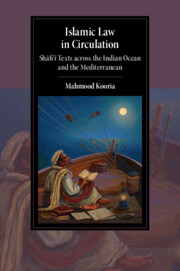Book contents
- Islamic Law in Circulation
- Cambridge Studies in Islamic Civilization
- Islamic Law in Circulation
- Copyright page
- Dedication
- Contents
- Figures
- Acknowledgements
- Notes on Transliteration, Dates and Places
- Chapter
- Introduction
- Chapter
- 4 The Code
- Chapter
- 5 The Commentary
- Chapter
- 6 The Autocommentary
- Chapter
- 7 The Supercommentaries
- Chapter
- 8 The Translations
- Conclusion
- Bibliography
- Index
- Other Titles in the Series:
7 - The Supercommentaries
from Part II
Published online by Cambridge University Press: 24 March 2022
- Islamic Law in Circulation
- Cambridge Studies in Islamic Civilization
- Islamic Law in Circulation
- Copyright page
- Dedication
- Contents
- Figures
- Acknowledgements
- Notes on Transliteration, Dates and Places
- Chapter
- Introduction
- Chapter
- 4 The Code
- Chapter
- 5 The Commentary
- Chapter
- 6 The Autocommentary
- Chapter
- 7 The Supercommentaries
- Chapter
- 8 The Translations
- Conclusion
- Bibliography
- Index
- Other Titles in the Series:
Summary
This and the next chapter explore the gradations of this process in which Shāfiʿī texts contributed to and benefited from the eventual globalisation, modernisation, technological headways, legal and intellectual networks, and mobility of people, ideas and texts. This chapter in particular focuses on two supercommentaries on the Qurra via its autocommentary Fatḥ to analyse internal responses within the school to textual longue durée, coinciding with and influenced by several major historical developments across the world. It argues that the nineteenth century was a period of multiple syntheses for Shāfiʿīsm in terms of its geographical, intellectual and cultural realms, due to new challenges and prospects it came across in the wider society and specifically among Muslims. The existing internal and inherent divisions in the school were reconciled through constant efforts of its jurists, and this synthesis addressed a larger division in the Islamic world. Faced with new trials from political and legal entities and a few minor but radical sections of the community the traditional body of believers united against what they called bidʿa or false invention. These supercommentaries represent different geo-cultural and political backgrounds, as much as they reflect common trends of their time in adapting the attitudes of many divisions in the school.
Keywords
- Type
- Chapter
- Information
- Islamic Law in CirculationShafi'i Texts across the Indian Ocean and the Mediterranean, pp. 281 - 320Publisher: Cambridge University PressPrint publication year: 2022



